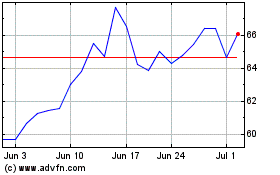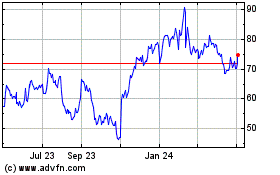By Khadeeja Safdar
Liz Carlson forked over $70 for a "heavyweight cotton" hoodie
after seeing an enticing ad on Facebook that claimed it had "the
softest interior we've ever created."
"I love hoodies, so when I saw that ad, it spoke right to my
heart," said Ms. Carlson, a 32-year-old in Oakland, Calif.
The ad was from an e-commerce site called Affinity Find, which
has more than 700,000 Facebook followers--about the same as
eyeglass seller Warby Parker. Affinity Find sells dozens of
products on its website, which says a store is coming soon to
downtown Seattle.
Ms. Carlson's hoodie, however, arrived three weeks after she
ordered it from an address in China. "It was reeking of a pungent
chemical smell like gasoline," she said. "The item was a rough
combination of synthetic fibers with no tags and plastic zips."
Affinity Find is run by Jonathan Smith, the owner of Clear Creek
Marketing & Sales LLC in Poulsbo, Wash. Mr. Smith declined to
comment and asked The Wall Street Journal not to publish his name,
citing "copycat entrepreneurs."
Welcome to a little-known corner of the e-commerce world, where
small entrepreneurs use social-media ads and hip virtual
storefronts to entice people into buying products listed on online
marketplaces such as Alibaba Group Holding Ltd.'s AliExpress.
The process often involves online storefronts transferring
customer details to an AliExpress seller, which ships the goods
directly to the customer; the storefront bills the customer. Called
dropshipping, it is a twist on a fulfillment technique that major
online retailers also use to send goods directly from their
manufacturers to the customer.
The entrepreneur profits by charging a high markup, betting
shoppers are unlikely to stumble upon the less-expensive goods on a
marketplace site. AliExpress is the most popular such marketplace,
but some entrepreneurs order from sellers on other marketplace
sites like Amazon.
The hoodie that Ms. Carlson purchased on Affinity Find for $70,
plus shipping and tax, is available on AliExpress for about $20
with free shipping to the U.S. Several other items for sale on
Affinity Find match listings at lower prices on the Chinese
marketplace.
Affinity Find has an F rating with the Better Business Bureau,
whose website says it found advertising issues and received
complaints about products, service and delivery.
The same hoodie was being pushed by other sites, including Sugar
Picks, which says it sells "carefully selected unique products,"
and Teelandia, which says it collaborates with local artists to
design clothes. Both sites posted Facebook ads in January with the
same language and images as Affinity Find's ad.
A representative for Sugar Picks, which lists an address in
Casper, Wyo., said in an email that the site has discontinued the
practice of dropshipping, noting "the bulk of our expenses comes
from advertisement cost which can be higher than the product cost
itself." Teelandia, which lists a Las Vegas address, didn't respond
to requests for comment.
Such sites often use Shopify Inc., a commerce platform where
sellers create their own e-commerce storefronts. In a blog post,
Shopify provides detailed instructions on how to sell using
AliExpress, calling it "retail arbitrage." It said it doesn't
comment on individual sellers that use its platform.
Craig Miller, Shopify's chief product officer, said the company
wants more people to start businesses. "If the quickest way for
someone to start being an entrepreneur and to try it out is to
resell someone else's products, I actually don't think there's
anything wrong with that, " he said. "But again I want to make sure
that whoever does sell online really stands behind their
products."
Facebook said it is taking steps to ensure people have good
experiences when they buy items from ads on the platform. "We're
developing a new way for people to flag businesses that deliver
products or services that are overwhelmingly unsatisfactory," said
Joe Osborne, a Facebook spokesman. "We think this can help hold
businesses more accountable."
A spokesman for Alibaba, which owns AliExpress, declined to
comment.
Flipping products from AliExpress has become so common that
self-proclaimed experts are selling online courses teaching
tactics, such as how to pick products that people are least likely
to research online and how to hide the original price of the
items.
From the balcony of a three-story mansion in San Diego, Kevin
David tells YouTube viewers how he left an unfulfilling office job
to make an e-commerce fortune. The 28-year-old, who sells a Shopify
course for about $1,000, says in the video that he generates
hundreds of thousands of dollars a month in sales from Shopify.
"Dropshipping is a beautiful business model," he says.
In an interview, Mr. David said he makes money from
Shopify-related businesses, including sales of his course, and
isn't sure how much he earns from dropshipping. He chalked up
complaints about dropshipping to problems with specific
storefronts.
"It's like any other business," he said. "Some people do it more
professionally, and some people do it less professionally."
Many online sellers run small operations out of their homes or
offices; they curate items from AliExpress and other marketplaces,
often using the same images, then generate enticing ads for
Facebook and Instagram.
When a customer orders from a Shopify-hosted storefront, the
seller transfers the shopper's shipping details to AliExpress. Many
sellers automate the transfer using an app called Oberlo, which
Shopify acquired last year. The app can pull products from
AliExpress into Shopify and send a default note to the suppliers
asking them to refrain from putting an invoice in the package.
Casey Ark, a 27-year-old in Bradenton, Fla., runs multiple
Shopify sites with more than three million total Facebook
followers. He said dropshipping is no longer lucrative since
Facebook's ad prices have risen and more people have launched
copycat storefronts. "The ad saturation is nuts," he said.
Jim Oberman contributed to this article.
Write to Khadeeja Safdar at khadeeja.safdar@wsj.com
(END) Dow Jones Newswires
May 20, 2018 08:14 ET (12:14 GMT)
Copyright (c) 2018 Dow Jones & Company, Inc.
Shopify (NYSE:SHOP)
Historical Stock Chart
From Mar 2024 to Apr 2024

Shopify (NYSE:SHOP)
Historical Stock Chart
From Apr 2023 to Apr 2024
